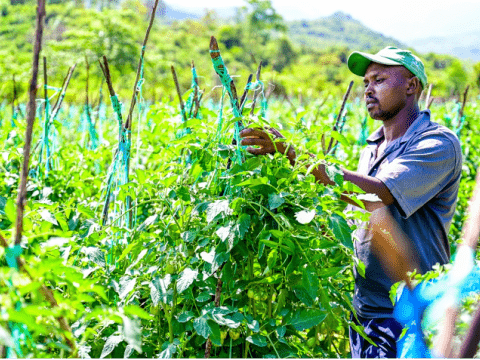Turning Over a New Leaf: From Charcoal Burner to Environmentalist

By Hellen Owuor, Communications Specialist (CRIFSUP), World Vision Kenya
Ezekiel Murei is a 33-year-old farmer from Kenya's hilly Kipkechir village in Elgeyo Marakwet County. He wakes up early every morning to tend to his farm. He takes great pleasure in working his 40 acres of land, where he lives with his wife Nelly Chelimo and their two children.
Ezekiel used to be a charcoal burner, but he has since become a passionate farmer and environmentalist after receiving training from World Vision on the Farmer Managed Natural Regeneration (FMNR) approach. In 2022, World Vision's Central Rift Farmer Managed Natural Regeneration Scale-Up Project (CRIFSUP), funded by the Australian Government, trained 1,000 farmers across four counties in Kenya (Baringo, Elgeyo Marakwet, Nakuru, and West Pokot) on this low-cost tree regeneration approach.

By the time Ezekiel received FMNR training, he had already deforested 20 acres of land to make charcoal. Because of the environmental damage he caused, he was chosen as one of the Lead Farmers to be trained in order to restore his degraded land. Ezekiel says that in addition to FMNR, he has also learned about soil conservation techniques, intercropping, and irrigation, all of which help him generate income for his family.
He currently grows 4,000 tomatoes on his farm, which he expects to sell for a profit of about 300,000 Kenyan shillings (1,895.2 USD) after deducting all expenses. He also grows vegetables like black nightshade, spinach, and kale, which bring in at least 2,000 Kenyan shillings (12.63 USD) per week when sold. In addition, he grows groundnuts, beans, and maize.
Ezekiel used to think that charcoal burning was the only way to make money. He admits that it was a risky business, as he could have been arrested by law enforcement officers. "When I saw a tree, I only thought about how much money I could get from it," Ezekiel says. "I made quick money selling charcoal, but it wasn't sustainable. I would stay out late making charcoal in the cold, with no sleep and no time to spend with my family."
Ezekiel feels guilty about cutting down trees and burning them, as it left the land bare and vulnerable to erosion.

Now, whenever Nelly talks about her husband's transformation, she is overcome with joy. She used to be against his charcoal burning and worried about the environmental damage it was causing. She was also concerned about his health, as he was regularly inhaling smoke.
"He has really changed since he began attending World Vision trainings," Nelly says. "Unlike before, when he used to disregard my opinions, he now consults me when it comes to decisions that impact our family."

Nelly adds that Ezekiel now spends more time with his family and even does chores around the house with her. Their 12-year-old daughter has also become interested in farming and environmental conservation, inspired by her father's commitment.
"Project participants and their spouses go through Gender Inclusive Financial Training [GIFT]," explains Titus Kiplagat, Project Officer and Agricultural Specialist at CRIFSUP. " This training fosters trust, transparency, love, and inclusivity in households. Many couples report that after completing the training, money is no longer a point of contention, and women feel heard and included in decision-making."
"I have been practicing FMNR for the past two years," Ezekiel says. "My land has changed, but so has my perspective. The benefits we have enjoyed inspire my family and I to protect the environment."
"In the past, crops would dry up, yields would be low, and it would be extremely hot," he adds. "Now, the regenerated trees provide shade for the crops, our homestead is cooler, and the soil is more fertile thanks to the plant residue left behind after pruning. My wife also gets firewood from the pruning."
Nelly's improved energy-saving cookstove uses less firewood and emits less smoke than the traditional three-stone stove. She says that a bunch of firewood used to last her two days with the old stove, but now it lasts her two weeks.

Ezekiel is a visionary farmer who has planted 800 pixie fruit trees so far and plans to have 3,000 by 2025. He has done his research and is confident that selling these locally in-demand fruits will be profitable. He also intends to expand the three acres of land he has currently set aside for FMNR to 23 acres. He is currently saving up to purchase a water tank, solar pump and ten Saanen goats that will produce milk for sale to boost his income.

In his community, Ezekiel has trained 15 farmers who are actively applying the FMNR approach. Cumulatively, they have 33 acres of land under restoration. Additionally, several locals stop by his farm to learn from him regarding the tree regeneration approach. Now that he has more time on his hands, he can participate in community events and go to peer sensitisation groups for personal growth.
" Your life, mindset, finances and well-being will all transform when you learn and practice FMNR," Ezekiel says, describing his perspective on the FMNR practice.